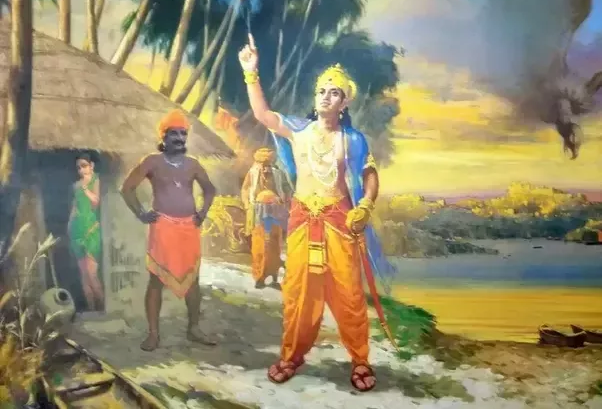A young man stood at the entrance to Hastinapur city, waiting for his father’s chariot. His name was Devavrata, and he would also be called Bhishma the terrible for taking an oath that changed the course of the entire Kuru empire.
He waited anxiously for his father’s chariot. His father, King Shantanu, and a few select warriors had gone for an extended outing to the forest. He saw a cloud of dust, and within seconds, the convoy of chariots swept past him. Devavrata was hurt that the king ignored royal protocol and his son. He was also worried that the king might be hurt or sick. Devavrata was used to the king ignoring him. He was always immersed in the memory of Devavrata’s mother. She had left him after he had stopped her from immersing Devavrata in the river Ganges immediately after his birth. She gave the king a sad look and walked into the river. People said she was Mother Ganges, who had incarnated to liberate eight divine souls cursed by a saint for a misdemeanor, but who was to say it was true? Shantanu seemed to hold Devavrata responsible for his separation from his beloved wife. Hence, Devavrata never remembered a kind glance or happy word from his father. His youth was spent training with ascetics in the forest, and he felt out of place in the palace.
These thoughts swirled around in his head when he entered his father’s chambers. His father was lying listless on his bed. He barely acknowledged Devavrata’s presence. When quizzed about his health and state of mind, King Shantanu replied he was worried because he had only one son, and if anything were to happen to Devavrata, the king and the entire kingdom would be in peril. Devavrata swooned, trying to understand the meaning of his father’s words. When did his father start feeling so much concern for him? Was his father talking about getting him married? Was his father thinking of getting married himself? What did this mean? Devavrata went out to meet the prime minister, who described how his father had fallen in love with a fisherman’s daughter and what he witnessed was a love-struck king and not a concern-driven father. He asked the prime minister why his father did not marry the woman. Any woman would be happy to marry the king. The prime minister stated that the fisherman asked for a condition that broke the king’s heart.
Devavrata immediately gathered a small platoon and rode to the fisherman’s cottage. He petitioned his father’s case, and the fisherman listened respectfully. Then the fisherman described how he found his daughter in the river as an infant. She was abandoned but was dressed like a princess. He added that as a responsible father, he was responsible for safeguarding his daughter’s happiness. The king was old, and if he died in a few years, his daughter was guaranteed a future only if her children were guaranteed the throne. Devavrata immediately swore that he gave up all rights to the throne, and the fisherman could rest assured knowing his daughter’s future was safe.
The fisherman gave him a shrewd look. He told Devavrata that the emperor walked away dejected because he could not make a promise on Devavrata’s behalf. Similarly, Devavrata could not make a promise on behalf of his children. Devavrata understood the implications and swore that he would never engage in a relationship with any woman ever in his life. The combination of these two vows meant we now call his Bhishma — the terrible one. He was relieved after making the vows. He has seen his father’s life tormented by the loss of one woman. The moment he found another woman equally attractive, he was not pining for her affection, irrespective of its impact on his son’s life. He had accepted both women simply due to his physical attraction toward them. Having been brought up among ascetics, Bhishma felt their life of abstinence was far more suited for him.
The fisherman’s daughter Satyavati now accompanied Bhishma to Hastinapura. As he rode towards the city, a host of questions emerged in his consciousness. They were all centered around Dharma.
- His father had lost his senses in pining for a young woman. He spent most of his life pining for his first wife, and now this woman? Was it Dharma to obey all whims and fancies of his father even when they appeared utterly irrational?
- This young woman has absolutely no say in this whole situation. She may have liked a young ascetic or fisherman in her community. Was it Dharma to barter her life away by promising the kingdom to her children?
- The kingdom is essentially the citizens of the country. Was he being fair to them by walking away from being a king? After all, he had trained his whole life for that.
- Why was it a son’s duty to act upon his father’s wishes, even if they were irrational? Rama was a man who walked away to the forest to respect his father’s word and returned as a god.
- Did the father have no duties towards his son? Why did Dharma only talk about the responsibilities of a son? Was the act of giving birth enough to get a boon of eternal loyalty from a child?
- Bhisma was confused about what Dharma meant. Was it a universal code he had to follow, or was it something personal based on his interpretation? I have kept this open-ended because I am incapable of giving you this answer. You can review the Spiritual Lessons section to discover what Dharma means.
This story is taken from Mahasamar, written by Narendra Kolhi. You can find the audiobook here. A big thanks to Divya Vanshika for sharing this book with me.
Applying This Story At Work
The questions that Bhishma asks himself are very similar to questions managers ask themselves every day. The global economy is currently in a painful period. Amazon, Meta, and Salesforce have announced large-scale layoffs, and Linked In is flooded with messages of sympathy, advice, help, and some vitriolic criticism of organizations and leaders. What is the right thing to do? Should you reduce everyone’s salary in the company and not let anyone go? How much compensation can you give without damaging the company’s ability to compete and operate? Should you provide special consideration to people with a work visa who may be deported? Can you ever have the correct answers to all these questions? Is there a universal codebook we can follow?
All this reminded me of a leadership training I attended a few years ago. We were divided into teams of ten people and had to use business simulation software to set up and run a business. There was a 300-page book with instructions, and most of us ignored it and decided to learn on the go. We completely crashed the business on Day 1. However, our mistakes became a foundation for our lessons on Day 2, when we soared like a phoenix. However, we had to shut down businesses and factories and use that money to fund the new growth we achieved on Day 2. The instructors commented in the end that they had rarely seen any team sink so low and recover so quickly in the many years they taught the simulation. However, what remained with me was how our mistakes on Day 1 led us to shut down factories at the beginning of Day 2. The money we generated from that activity funded our growth. This is what happens in so many workplaces every single day.
Leaders have the difficult job of making big bets and living with the consequences of those choices. Microsoft bet big on the phone and lost. However, they won the cloud bet. Amazon lost big on its Kindle Fire, and Alexa is much smaller than expected. Google lost big on social media, and now Chat GPT is threatening its existence. Netflix only used to compete with sleep before Disney and Amazon rapidly eroded its market share. Leaders got it wrong in all those situations, and everyone paid the price. That happens in economies, wars, businesses, and every other aspect of life. Hence, both employers and employees have to watch out for their own self-interest.
When it comes to organizational psychology, the closest equivalent you have to Dharma is culture. Every organization can create its own culture or Dharma and follows it. That’s why some organizations give more benefits and health coverage than others. That’s why the same process at Salesforce seems much more humane than the bloodbath at Twitter. That’s why Netflix would pay you to walk away if you think you are not the best fit for the organization. When you sign up to work for an organization, you also agree to shape that culture and will be impacted by it. That should be a significant factor while making a big career move.
Spiritual Lesson From This Story
My guru Om Swami explains that Dharma is very different from religion. He says the essence of Dharma is “knowing what I ought to be doing under any given circumstance.” Your Dharma is personal to you and driven by your circumstances and situations. He explains how Arjuna tried to give Krishna many reasons why the Kurukshetra war was against Dharma. Krishna finally told Arjuna that all his knowledge was bookish and did not come from direct experience.
When it comes to this post, I am like Arjuna. Hence, my telling you anything about Dharma will be misleading you. This post is full of questions and no answers because you must find your Dharma. Here are some nuggets that should help you get started.












Comments & Discussion
18 COMMENTS
Please login to read members' comments and participate in the discussion.